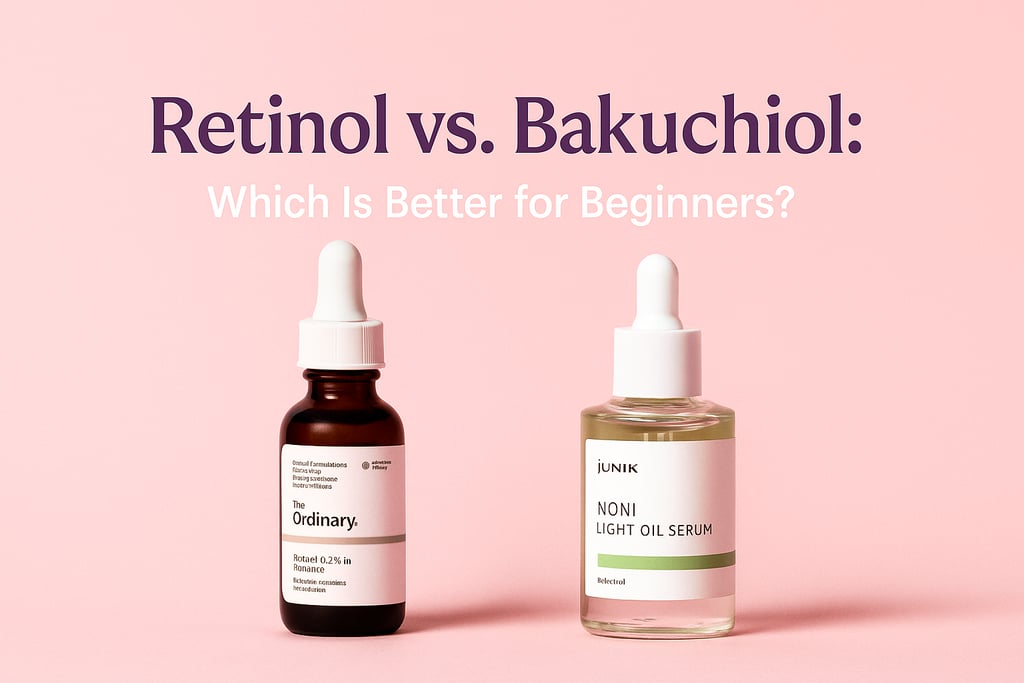Retinol vs. Bakuchiol: Which Is Better for Beginners?
Mô tả bài đăng trên blog.
WHAT WE RECOMMENDSKINCARE & CLEAN BEAUTY
8/2/20252 min read


Retinol vs. Bakuchiol: Which Is Better for Beginners?
Retinol is a powerhouse. Bakuchiol is the buzzy new plant-based alternative.
Both claim to fight wrinkles, smooth skin, and boost glow. But if you're just starting your skincare journey, which one should you reach for?
Let’s break down the pros, cons, and myths — and help you decide what’s right for your skin.
🧴 What Is Retinol?
Retinol is a derivative of Vitamin A and one of the most studied skincare ingredients.
It speeds up skin cell turnover, stimulates collagen, and helps unclog pores. The result?
✔️ Smoother texture
✔️ Fewer breakouts
✔️ Improved fine lines and tone
But here's the catch: retinol can be intense, especially for beginners. Common side effects include:
Redness
Dryness
Flaking
Sensitivity to the sun
That’s why it’s often introduced slowly and used with lots of hydration and sunscreen.
🌿 What Is Bakuchiol?
Bakuchiol (pronounced buh-koo-chee-ol) is a plant-derived ingredient extracted from the babchi seed.
It’s been gaining traction as the gentler, natural alternative to retinol — with similar anti-aging and brightening effects.
The benefits?
✔️ Less irritation
✔️ Safe for sensitive skin
✔️ Can be used during pregnancy (retinol should be avoided)
✔️ Antioxidant-rich and soothing
While bakuchiol hasn’t been studied as extensively as retinol, early research shows promising results.
🔍 How Do They Compare?
Retinol has been studied for decades and is widely recognized for its effectiveness in reducing fine lines, improving skin texture, and fighting acne. However, it can be irritating — especially for beginners — and often requires a slow introduction with plenty of hydration and sun protection.
Bakuchiol, on the other hand, is a plant-based alternative that delivers similar anti-aging and brightening benefits but without the irritation. It’s gentle enough for sensitive skin, can be used both morning and night, and is safe during pregnancy — unlike retinol.
While retinol tends to show faster results in 4 to 12 weeks, bakuchiol works more gradually, usually within 8 to 12 weeks. Both are effective, but the right choice depends on your skin’s sensitivity, goals, and how much downtime you're willing to manage.
👶 So… Which One’s Better for Beginners?
👉 If you’re a skincare beginner, start here:
Bakuchiol is the safer choice if you have sensitive skin, eczema, or are nervous about irritation.
Retinol is best if you want stronger results and are willing to go slow, buffer with moisturizer, and deal with a short adjustment phase.
It’s not about which is better overall — it’s about what’s better for you right now.
🛍️ Editor’s Picks
🌿 Bakuchiol Picks:
iUNIK Noni Light Oil Serum – calming, hydrating, bakuchiol-infused
By Wishtrend Vitamin A-mazing Bakuchiol Night Cream – gentle retinol-alternative
🧴 Retinol Picks for Beginners:
The Ordinary Retinol 0.2% in Squalane – a low dose to start slowly
COSRX Retinol 0.1 Cream – beginner-safe and buffered with hydrating ingredients
✨ Available on PinknBlossom.com — free shipping over $65 CAD and free samples included!
✅ Final Thoughts
If you’re new to skincare, bakuchiol is a gentle way to ease into anti-aging. If you’re ready to level up and want clinically proven results, retinol is the gold standard — just go slow and moisturize well.
No matter which one you choose, consistency is key. Glowing skin doesn’t happen overnight — but with the right routine, you’ll get there.
Quality You Can Trust
Discover handpicked, high-quality products that support a healthier, more intentional lifestyle.
Contact
Stay in the Loop
© 2025 Dealaha™ All rights reserved.
